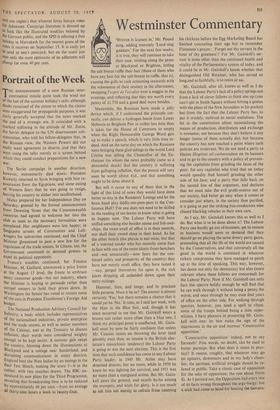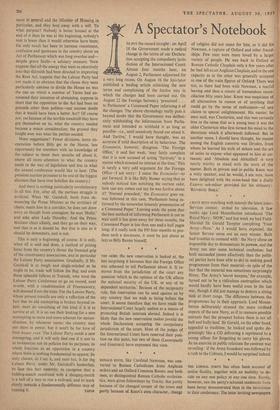Westminster Commentary
Meanwhile, the Russians have made a jolly device which, if I understand the principle cor- rectly, can deliver a hydrogen bomb from Lower Slobovia to Brighton Pier in rather less time than it takes for the House of Commons to empty when the Right Honourable George Ward gets up to make a speech, which is very little time in- deed. And on the same day on which the Russians were bringing these glad tidings to the world Lord Citrine was telling the Chancellor of the Ex- chequer (to whom the news probably came as a distasteful shock) that the country is suffering from galloping inflation, that the pound will very soon be worth about 4id., and that something ought to be done about it.
But will it occur to any of them that in the light of this kind of news they would have done better to stay in the Residents' Lounge and let the brass band play tiddly-om-pom-pom in the Con- ference Hall? For one does not need to be skilled in the reading of tea-leaves to know what is going to happen now. The Labour Party will have sniffed something else besides ozone and fish-and- chips; the sweet smell of office is in their nostrils, nor shall their sword sleep in their hand. As for the other bunch (the phiase is not mine, but that of a worried reader who has recently come face to face with one of the more idiotic front-benchers and—not unnaturally—now fears for the con- tinued safety and prosperity of the country) they have not merely smelt office, they have tasted it —nay, gorged themselves fat upon it, the rich juices dripping all unheeded down upon their natty suitings.
Hammer, then, and tongs; and to precious little purpose. Must it be so? The answer is almost certainly 'Yes,' but there remains a chance that it could yet be 'No.' It rests, as I said last week, with the Man in the Blue Suit, and, though it has since occurred to me that Mr. Gaitskell wears a brown suit rather more often than a blue one, I think my principal point is unaffected. Mr. Gaits- kell must by now be fairly confident that unless Mr. Cousins insists on throwing the lever (and possibly even then, so intense is the British elec- torate's masochistic tendency) the Labour Party is going .to win the next election. This is the first time that such confidence has come to any Labour Party leader; in 1945 Mr. Attlee may have dreamed dreams, but no more, while in 1950 he knew he was fighting for survival, and 1951 was no more than a rearguard action. But Mr. Gaits- kell paws the ground, and sayeth ha-ha among the trumpets, and waits for glory. Is it too much to ask him not merely to refrain from counting his chickens before the Egg Marketing Board has finished concealing their age but to remember Ftatateeta's prayer : 'Forget not thy servant in the hour of thy greatness'? For Mr. Gaitskell's ser- vant is none other than the continued health and vitality of the Parliamentary system of today, and it could lie in Mr. Gaitskell's hands whether that distinguished Old Retainer, who has served so long and so faithfully, is to retire or no.
Mr. Gaitskell, after all, knows as welt as I do that the Labour Party's lack of a policy springs not from a lack of clever fellows to think one up (you can't spit in Smith Square without hitting a genius with the plans of the New Jerusalem in his pocket) but from the fact that the Labour Party has, to put it crudely, outlived its social usefulness. The bit in the constitution about nationalising the means of production, distribution and exchange is nonsense; not because they don't believe it any longer (some of them actually do), but because the country has now reached a point where such policies are irrelevant. We do not need a party to blazon Illegitimi nil carburundum on its banners and to go to the country with a policy of prevent- ing the capitalists from grinding the faces of the poor, for any capitalist who tried that on today would speedily find himself grinding the other side of his face; and a party that falls back on the second line of that argument, and declares that we must take the evil profit-motive out of our society, had better go easy when it comes to consider just where, in the society thus purified, it is going to put the striking bus-conductors who chased blackleg vehicles in their own cars.
As I say, Mr. Gaitskell knows this as well as I do. But what is to be done about it? The Labour Party can hardly go out of-business, yet to remain in business would seem to demand that they should go on playing the same dreary party game, pretending that all the ills of the world are caused by the Conservatives, and that conversely all the good in the world is contained in whatever rickety compromise they have managed to patch up at the time of speaking. This way, however, lies doom not only for democracy but also (more relevant where these fellows are concerned) for the Labour Party. Now if Mr. Gaitskell can only face this spectre boldly enough he will find that he can walk through it without being a penny the worse, and once through he may even find years of office on the other side. For walking through spectres, however, you need a spell to chant, some of the troops behind being a mite super- stitious. I have pleasure in presenting Mr. Gaits- kell with one; let him make the sign of the macrocosm in the air and murmur 'Constructive opposition.'
'Constructive opposition' indeed, not to say forsooth ! Fine words, no doubt, can be used to butter parsnips. But what does it mean in prac- tice? It means, roughly, that whatever may go on upstairs, downstairs and in my lady's cham- ber, the partisan, artificial struggle should be re- laxed in public. Take a classic case of opposition for the sake of opposition; the row about Form G. As I pointed out, the Opposition had every one of its facts wrong throughout the argy-bargy; but a stick had come to hand for beating the Govern- ment in general and the Minister of Housing in particular, and they beat away with a will. To what purpose? Nobody is better housed at the end of it than he was at the beginning, nobody's rent is lower than it would otherwise have been; the only result has been to increase resentment, confusion and ignorance in the country about an Act of Parliament which was long overdue and— despite grave faults—a salutary measure. Now suppose that all the energy that went so abortively into that skirmish had been directed to improving the Rent Act, suppose that the Labour Party had not made it so obvious that the clause they were particularly anxious to divide the House on was the one on which a number of Tories had an- nounced their intention of abstaining, suppose in short that the opposition to the Act had been on grounds other than politics—can anyone doubt that it would have been a better Act? Of course not; yet because of the terrible treadmill they have got themselves on to, what the country needed became a minor consideration; the ground they fought over was what the parties needed.
More suggestions? Fewer divisions, more co- operation before Bills get to the House, less opportunity for members with no knowledge of the subject to shoot their mouths off about it, above all more attention to what the country needs in the way of legislation and less to what the annual conference would like to hear. (The pensions auction promises to be one of the biggest disasters that have ever befallen the country.) And there is nothing particularly revolutionary in all this. For, after all, the partisan struggle is artificial. When Mr. Gaitskell, fresh from de- nouncing the Prime Minister as the architect of chaos, meets him in a corridor, he does not draw away as though from contagion; he says 'Hullo,' and asks after Lady Dorothy. And the Prime Minister chats affably, and they go on their way, and that is as it should be. But that is also as it should be downstairs, and is not.
This is only a beginning, of course. It is only, when all is said and done, a method of prising loose from the country's throat the frenzied grip of the constituency associations, and in particular the Labour Party associations. Gradually, if Mr. Gaitskell is as tough and single-minded as he ought to be, trade will follow the flag, and even those splendid fellows at Toxteth, who want the Labour Party Conference to go on record, next month, with a condemnation of Freemasonry, will descend from the trees. For the Labour Party, whose present travails are only a reflection of the fact that its old mainspring is broken beyond re- pair, must do something of this kind if it is to survive at all. It is no use their looking for a new mainspring in more and more schemes for nation- alisation, by whatever name; the country may put them in power, but it won't be for love of their beaux veux. The Labour Party needs a new mainspring, and it will only find one if it sets to to re-examine not its policies but its purposes, its whole function as an opposition in a country where there is nothing fundamental to oppose. Its only chance, as I see it, and ours too, is for thg Labour Party, under Mr. Gaitskell's leadership, to face this fact squarely; to recognise that a bidding-match combined with a slanging-match is a hell of a way to run a railroad, and to work slowly towards a fundamentally different way of































 Previous page
Previous page